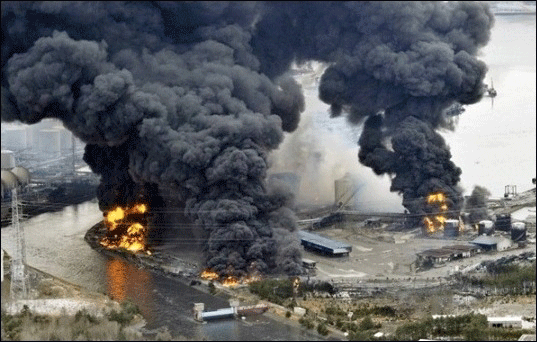Responses to Carter statement on Ex-UPP Assemblyman Lee Suk-ki
More than 60% of the people in the Republic of Korea (south) are opposed to the so-called ‘Carter letter on Lee Suk-ki’ but there are some 25% who support the Carter statement and some of them even respect the former President of the United States as a ‘hero and savor who saved the Korean people north and south from a nuclear holocaust and genocide of the Korean people in 1993.’The Korea Post presents the four typical views of the leading Korean-language independent media, two in against the Carter let and two against.
The Cater Center of former President Jimmy Carter of the United States issued a statement on Dec. 18, 2014 which noted with concern the conviction of former National Assemblyman Lee Suk-ki of the recently disbanded United Progressive Party (UPP) by the Seoul High Court on a charge of insurrection conspiracy.
It said that the conviction was based on taped remarks that Lee made to his political followers and for which he has been sentenced to nine years in prison.
Then it said, “We note, however, that Mr. Lee's conviction is taking place under the provisions of a highly restrictive National Security Law, established during the pre-1987 era of autocratic military rule, which appears to contradict both the Republic of Korea's international human rights treaty obligations and the nation's global reputation as a highly successful prosperous democracy.”
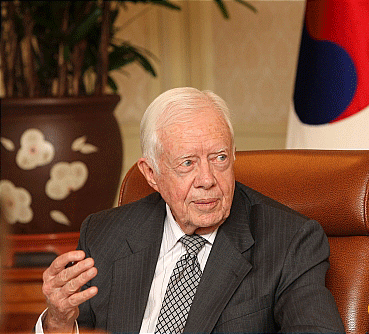
Then it quoted former President Carter as saying, “If Korea is to extend its essential role as a human rights leader in Asian and world affairs, there should be a fully transparent democratic debate open to all Korean citizens about current and potential risks to human rights under the terms of the National Security Law."
The statement further said that at a time when Americans are urgently debating congressional findings on the official use of torture, The Carter Center believes all nations are capable of protecting their national security while remaining faithful to their commitments under international human rights law.
The Carter Center statement has given rise to keen public discussions and review of the case in Korea divided between opponents and supporters.
However, the statement is largely considered to run counter to the view of the majority of the Korean people according to independent public polls which have been conducted in response to the ruling of the Constitutional Court of the Republic of Korea that was announced on Dec. 25, 2014 ordering the disbandment of the UPP and stripping five UPP lawmakers of their status as members of the National Assembly.
An opinion survey recently conducted by Real Meter and published by independent Korean-language daily Hankook Ilbo on Dec. 30, 2014 showed 61 to 64% of the respondents supporting the ruling and 24 to 28% opposing it.
A separate survey published by another independent Korean-language daily Joongang Ilbo showed 63.8% supporting the Constitutional Court decision to disband the UPP and 23.7% disagreeing with the decision.
In still another survey, which was published by the TV arm of a leading independent Korean-language business daily Maeil Kyungje indicated 60.7% supporting the Constitutional Court decision and 28% disapproving it.
In the case of the supporters of the ruling Saenuri Party, supporters of the nation’s top court decision to dissolve the UPP accounted for 88.7% of the respondents and even in the case of the supporters of the main opposition New Politics Alliance of Democracy (NPAD) 41.4% of the respondents supported the Constructional Court decision to dissolve the UPP while 45.1% were opposed to the ruling.
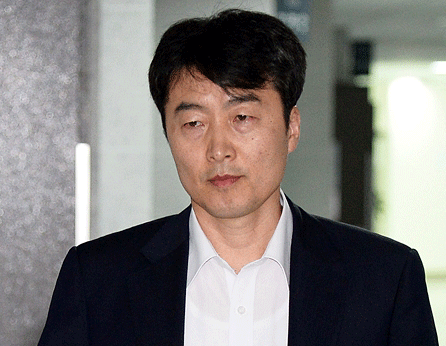
A typical media response critical to the statement of The Carter Center on the case of former UPP Assemblyman Lee Suk-ki came from the editorial of a leading independent conservative-oriented Korean-language daily, Donga Ilbo, published on Dec. 29, 2014 under a heading, ‘Carter Center’s misguided statement on Seoul`s human rights.’
Donga Ilbo is noted for independent reporting and sufferings as a result of its critical reports against the dictatorial regimes of the past such as the repressive government of the late former President Syngman Rhee and the military junta government the late former President Park Chug-Hee (father of incumbent President Park Geun-hye). The ‘Blank Advertisement’ case of Donga Ilbo is widely known when supporters of Donga ran blank advertisements as a means for donation to Donga as they were subjected to undue punishment by the authorities for running a commercial advertisement in Donga.
Excerpts from the Donga editorial on the statement of The Carter Center follow:
The Carter Center issued a statement on December 18 to seek release of former Unified Progressive Party lawmaker Lee Suk-ki and others, who are standing trials for the charge of conspiracy for treason and instigation. The statement claimed that “The ruling that found Rep. Lee Suk-ki guilty was issued based on provisions under the National Security Act that is very suppressive and which was enacted before 1987 during the military dictatorship.” Former President Carter said, “For Korea to expand its essential roles as a human rights leader in Asian and world affairs, opportunities should be left open to enable all (Korean) people to hold discussions in a complete, transparent and democratic way about human rights that are in jeopardy due to the National Security Act. ” It is regrettable that former President Carter, a Nobel laureate in peace, made criticism based on wrongful facts.
The charges Lee faces include violation of the National Security Act, but the main charges are collusion for treason and violation of the Criminal Code.
He was found guilty for the charges of conspiracy for treason and instigation for treason in the lower court trial, and was found guilty for the charge of conspiracy for treason in the appellate court trial. The Constitutional Court of Korea issued a ruling to dissolve the Unified Progressive Party for the first time in the nation’s party politics history due to Rep. Lee’s rebellion charges. The Carter Center issued the statement before the Constitutional Court made the ruling. As long as a country exists, any country will and can punish treason. The U.S. is also punishing those who commit rebellion, and legislated the Patriot Act, which is far tougher, after the 9/11 terrorist attacks.
The fact that the center’s statement suggests as if the National Security Act from before-democratization was applied to Rep. Lee is also an apparent inaccuracy. The National Security Act was amended in 1991. Even so, as for the crime of praising and supporting an anti-state organization in Clause 1, and the crime of production and possession of materials benefiting enemies in Clause 5, both under Article 1 of the act, the Constitutional Court ruled constitutional in a unanimous vote in 2004, saying “The possibility for abuse significantly decreased after the 1991 amendment. ” During the Roh Moo-hyun administration, there was an attempt to outright abolish the National Security Act, but the effort proved unsuccessful due to failure to garner public support. It looks as if former President Carter’s watch of human rights stopped during the Yushin (Revitalizing Reform) era under the late former President Park Chung-hee, when the former was the incumbent U.S. president.
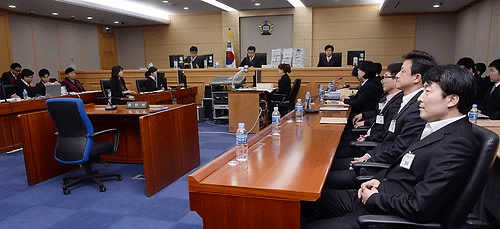
Carter visited North Korea several times. Despite his good intentions to improve the U.S.-North Korea relations or inter-Korean ties, his North Korea visits sometimes earned criticism from the U.S. and Korean media that they only served as a mouthpiece for North Korean dictatorships. South Korea’s judicial branch issues rulings independently of political power. The Carter Center’s view on of Lee’s trials is an act disregarding South Korea’s judicial system.
Here is a similar but a slightly different media response, which came from another leading independent conservative-oriented Korean-language daily, Joongang Ilbo, published on Dec 29, 2014. Excerpts follow:
The Carter Center sent a statement to South Korea’s Supreme Court expressing its concern over a pending case regarding Lee Suk-ki, a former National Assembly member, convicted of inciting others to revolt against the state. In the statement, the center expressed its cautious opposition to the highest court over convicting Lee of national rebellion, in violation of National Security Law.
The law was “established during the pre-1987 era of autocratic military rule,” it added, and therefore its application would “contradict both the Republic of Korea’s international human rights treaty obligations and the nation’s global reputation as a highly successful prosperous democracy.”
In what could be understood as its opposition to Seoul’s use of anti-North Korea laws in convicting those accused of being Pyongyang sympathizers, the non-profit organization said it “believes all nations are capable of protecting their national security while remaining faithful to their commitments under international human rights law.”
Former President Carter remarked, “If Korea is to extend its essential role as a human rights leader in Asian and world affairs, there should be a fully transparent democratic debate open to all Korean citizens about current and potential risks to human rights under the terms of the National Security Law.”
The Carter Center statement was released on Dec. 18, a day before the Constitutional Court sided with the Park Geun-hye government in its ruling that effectively disbanded the minor leftist UPP for pursuing North Korean ideology and putting national security at risk.
The court also stripped the accused party’s five lawmakers of their parliamentary seats, including Lee, who was a prominent UPP member.
The National Security Law forbids South Koreans from contacting North Koreans without government approval or posting materials supportive of the reclusive Communist regime.
In its latest Defense White Paper, to be published next year by the Ministry of National Defense, South Korea decided to maintain its position that the North Korean regime and its military are the nation’s “primary enemies.”
The 52-year-old former UPP lawmaker is appealing his conviction by a High Court in June that found him guilty of inciting members of the underground Revolutionary Organization within the UPP to instigate rebellion in the case of war with North Korea by destroying key infrastructure and facilities, such as telecom utilities.
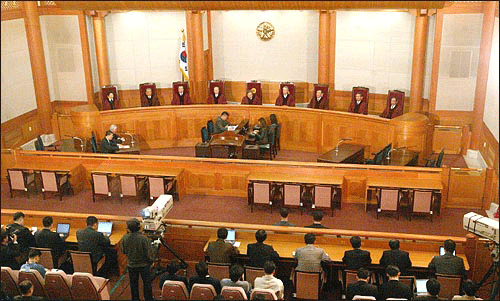
The appellate court sentenced him to nine years in prison. Lee appealed the ruling and his case is pending a Supreme Court’s decision, which is expected to be made sometime next month.
However, as the public opinion surveys indicate, there also are opponents against the Constitutional Court ruling ordering the disbandment of the UPP of Lee Suk-ki. A typical example is one from opposition-oriented Korean-language daily Hankyoreh Shinmun. Excerpts follow:
The Carter Center has sent a statement to the Seoul High Court expressing a concern over the conviction of former National Assemblyman Lee Suk-ki.
The statement said that the decision came based on the National Security Law that was made by the dictatorial military government before 1987.
Former President Carter retired from office in 1981, established The Carter Center at the Emory University at Atlanta in the United States, and has been working for the promotion of human rights, world health, dissolution of disputes and observation of elections. In 2002, Carter received a Nobel Peace Prize.
Some family members of the suspects charged with an attempted rebellion against the state, visited The Carter Center early this month through the good offices of former US Ambassador James Laney in Seoul, and submitted a petition to the Center. Ambassador Laney is known as a typical Jihanpa (a person who knows [and likes] Korea well).
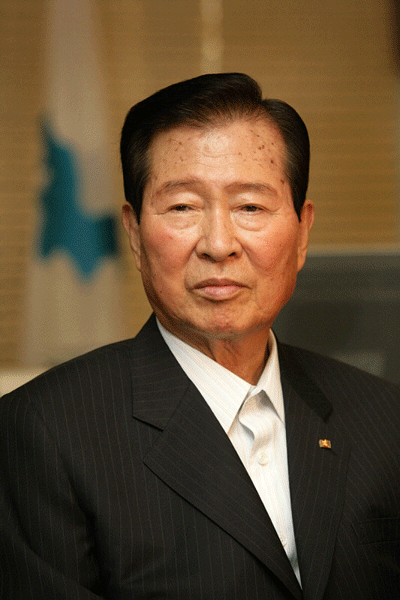
Influential people trying to help Lee Suk-ki are not limited to Ambassador Laney.
Cardinal Yeom Soo-jung of the Korean Catholic Church, Executive Chief Jaseung of the Korean Buddhist Jogye Order, Pastor Gim Yeong-ju of the National Council of Churches in Korea and Chief Abbot Namgung Seong of Korean Buddhist Wonbul-gyo Order, who are the leaders of the four major religious organizations in Korea, submitted a petition to the Seoul High court on Dec. 7, 2014. In the petition, they jointly stated, “We express our wish that the Korean society would no longer waste the energy of the country over senseless discord but there would be mutual understanding and tolerance between each other.
The Supreme Court All-member Panel examined the Rebellion Case on Dec. 18 and is expected to pass a judgment in the middle of January next year.
Here is another example of support for the statement of The Carter Center, which was written by opposition-oriented Columnist Yoon Jae-Hak of the Maronie TV under a head reading “Will former President Jimmy Carter play the role of a savior one more time?” Excerpts follow:
If you search information by clicking “The First North Korean Nuclear Arms Crisis” or “Jimmy Carter,” you will learn how critical the situation was on the Korean peninsula over 20 years ago.
On Feb. 25, 1993, Kim Il-sung was in power in North Korea and President Kim Young-sam had just taken over the control of government in South Korea barely a month ago from outgoing President Roh Tae-woo.
On March 12, 1993, North Korea all of a sudden declared its withdrawal from the Nuclear Nonproliferation Treaty, and warned at the inter-Korean talks at Panmunjeom on March 19 that it would turn Seoul into a fiery inferno. It was the ‘First North Korean Nuclear Arms Crisis.’
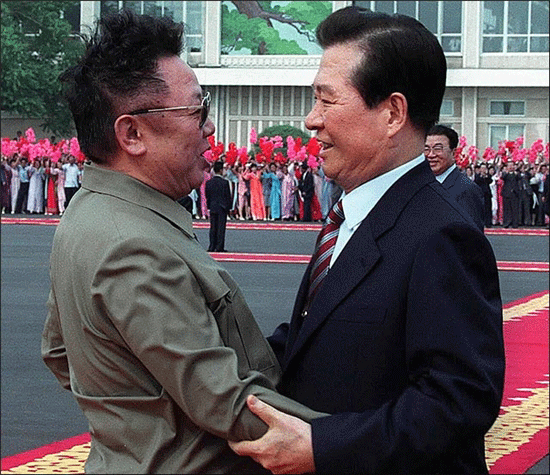
A five-color mushroom cloud was fast approaching the Korean peninsula. The mass communications media of South Korea spent almost all their time in covering the North Korean nuclear crisis partly at the request of the Kim Young-sam government. And the people in the South hoarded ramyeon instant noodle and rice as emergency rations while upstarts with dual citizenship secretly prepared to abandon and leave the country with their families if crisis really came.
At length, the then President Bill Clinton mobilized US aircraft carriers and ordered them to bomb the nuclear weapons-making facilities in North Korea. The Korean peninsula was moving toward a fiery holocaust step by step.
Some South Koreans, who fondly use such expressions as ‘Jongbuk’ (pro-North Korean elements), ‘Jwabbal’ (leftist Reds) and Bbalgaengi (Reds), might wishfully say, “The US should have bombed and turned the North Korean nuclear sites into a ‘mugwort field’ by devastating them and wiping all the Reds!”
If the US had done so, North Korea should have become a ‘mugwort field’ (meaning a ‘field where nothing other than mugwort {weeds} could grow’). Would the North Koreans have really awaited for such a fate with fold arms?
Never. The North Koreans, as everyone could guess, should have reacted, “Okay, you and we both die!”
It is not clear if there were any nuclear weapons in South Korea, but there were more than ten nuclear power plants in operation in the South, which were as dangerous as nuclear bombs.
Wouldn’t these atomic power plants have become the first targets for North Korea to strike?
If and when North Korea had really done it, the outcome would have been beyond our imagination.
We need only remember what happened to the Fukushima Nuclear Power Plant that was damaged by Tsunami, a natural calamity, rather than a purposeful attack.
The Korean race would have disappeared from this planet and the Korean peninsula would have been turned into a lifeless land where no man could live for hundreds of years thereafter. And not only the neighboring countries of Asia but also many other parts of the world would have to suffer serious nuclear fallout.
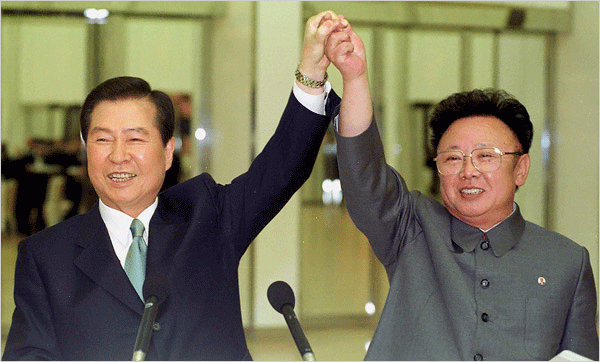
President Jimmy Carter, who had just retired, could not idly watch the development of situation with folded arms. He gladly offered to be the first US President, active or retired, to visit Pyongyang and meet with Kim Il-sung.
The meeting materialized and from this meeting with Kim Il-sung, Carter secured the Geneva Conference and the South-North Summit Talks.
This way, Carter stopped the ‘nuclear clock of the Korean peninsula’ from ticking seconds before its explosion.
It brought about the US-North Korean agreement in Geneva in 1994 and paved the way for a South-North summit which, however, did not happen due to the sudden death of Kim Il-sung, but which was postponed to a later date.
On June 13, 2000, a historic South-North summit was realized between President Kim Dae-jung and Chairman Kim Jong-il of North Korea for the first time since the division of the country into the north and south.
Unwise leaders in South Korea loudly spoke to North Korea but they were driving the country to the verge of genocide. The warm-hearted peanut farmer gentleman, Jimmy Carter, stopped the ticking of the nuclear clock seconds before it went off.
If the US aircraft carriers had actually bombed North Korea, the outcome would have been entirely different from how it was during the Korean War (1950-3).
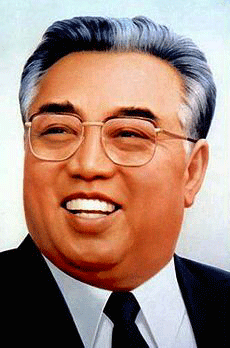
It is also said that President Kim Dae-jung was a good friend of Presidents Jimmy Carter and Bill Clinton but had a ‘dog-monkey’ (unfriendly) relationship with the two Bush Presidents.
There are reports that former President Carter who saved the Korean peninsula from falling into a nuclear inferno, has come to the rescue of former UPP National Assemblyman Lee Suk-ki.
Personally, I do not know Mr. Lee Suk-ki--nor do I wish to defend him at all. And I also think that it was a big mistake for the UPP to nominate the trouble-maker (Lee Suk-ki) as its proportional representation candidate for the National Assembly membership.
However, I deplore the reality where the democracy of the Republic of Korea should dissolve the third largest political party with members in the National Assembly through the use of a ‘tool known as the Constitutional Court’ for reasons that hardly substantiate in justifying the action.
Unfortunately, the statement of The Carter Center submitted to the Supreme Court of Korea shortly before the decision was made to disband the UPP and therefore the statement did not bear any reference to the dissolution of the UPP.
There have been so many Presidents in the US who were respected by the people. However, some of them were heroes of only the US who boasted the power of their country to the outside world and who increased the interests of the US at the expense of the interest of other countries.
In contrast, President Jimmy Carter who failed to be re-elected due to lack of support from the people, is the only President of the US who, after retirement, has been trying to help reduce the pains of the peoples in the world, who have been suffering from poverty, war and dictatorial rules.
However, no man of great power can resist ageing, and Jimmy Carter is no excepiton. He cannot do as well as he did in the past due to health.
I hope that he will live long, and continue to help the poor and helpless people around the world.
I hope that President Carter will save the democracy of the Republic of Korea just as he did so when he saved the Korean peninsula seconds before the outbreak of a nuclear holocaust.
President Jimmy Carter, you are the savior of the Republic of Korea, the 80 thousand people of the Korean peninsula and the entire mankind.
Long live, President Jimmy Carter!
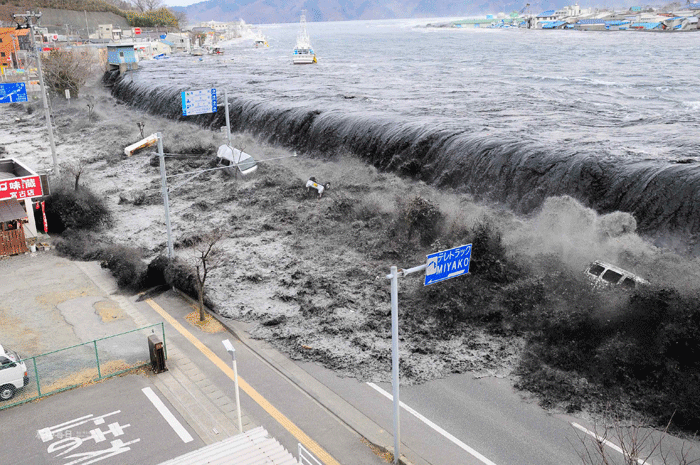
Text of statement of The Carter Center:
The Carter Center notes with concern the conviction of Republic of Korea incumbent lawmaker, Lee Suk-ki, a member of the National Assembly, by the Seoul High Court on a charge of insurrection conspiracy based on taped remarks he made to his political followers and for which he has been sentenced to nine years in prison.
The Carter Center will not comment on the merits of the facts presented in this case, which is currently on appeal before Korea's Supreme Court or interfere in any other way in the internal affairs of the Republic of Korea. We note, however, that Mr. Lee's conviction is taking place under the provisions of a highly restrictive National Security Law, established during the pre-1987 era of autocratic military rule, that appears to contradict both the Republic of Korea's international human rights treaty obligations and the nation's global reputation as a highly successful prosperous democracy.
"If Korea is to extend its essential role as a human rights leader in Asian and world affairs, there should be a fully transparent democratic debate open to all Korean citizens about current and potential risks to human rights under the terms of the National Security Law," said former U.S. President Jimmy Carter.
At a time when Americans are urgently debating congressional findings on the official use of torture, The Carter Center believes all nations are capable of protecting their national security while remaining faithful to their commitments under international human rights law.
"Waging Peace. Fighting Disease. Building Hope."A not-for-profit, nongovernmental organization, The Carter Center has helped to improve life for people in over 80 countries by resolving conflicts; advancing democracy, human rights, and economic opportunity; preventing diseases; and improving mental health care. The Carter Center was founded in 1982 by former U.S. President Jimmy Carter and former First Lady Rosalynn Carter, in partnership with Emory University, to advance peace and health worldwide
